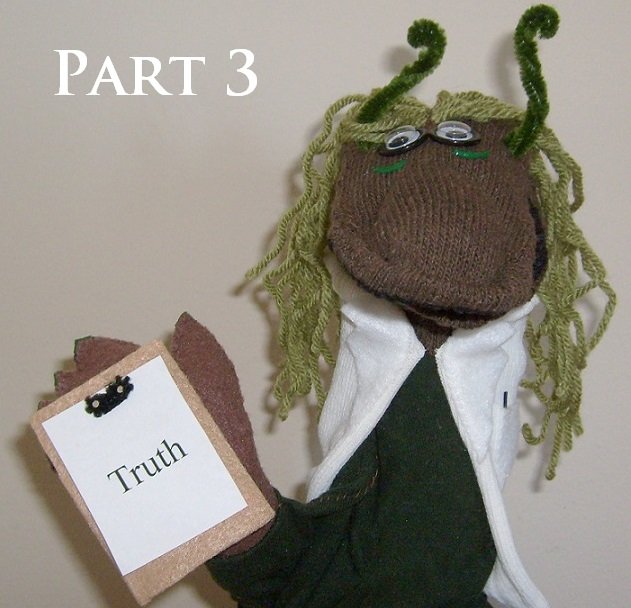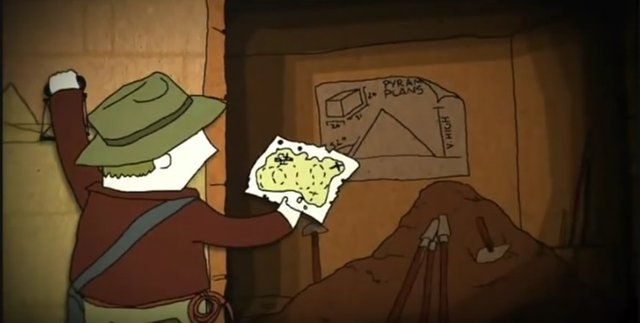Tracking Down Pseudoscience - Part 3

In my youth I used to believe in the existence of ghosts, psychic powers and all things paranormal. Did my beliefs fit in with good evidence leaning towards their existence? They did not, but I didn't know that. I was too absorbed...
Lucky for me, as I grew up and became interested in science, those beliefs dispelled one by one. We all engage in 'magical' thinking at some level. I think we should not allow ourselves to, but of course, it remains up to the individual to decide what to do with their life.
For those wanting to become educated in good thinking, for those who want to be able to spot the baloney and the potential intentions towards deception in other people's claims and arguments, and for people who are interested in sound reasoning, Carl Sagan and Michael Shermer propose their baloney detection kit, a set of questions that one should ask when in doubt.
I will discuss one or two questions per each post in this series. Here are the previous posts:
1. How Reliable is Your Source
2. Tracking Down Pseudoscience - Part 2
Today, I'm going to get into questions 4 and 6 from the baloney detection kit, leaving the rest of the questions for future posts in this series.
Baloney Detection - Points 4 and 6
Questions 4 and 6 refer to how claims fall into the bigger picture and where the majority of evidence for a claim points to. Let's get into them specifically.
Question 4: How does the claim fit with what we know about how the world works?
I'll outline the example presented by Michael Shermer:
Some people enjoy discussing about the potential mysteries behind the Egyptian pyramids. They like to think that the pyramids were built by an intelligent long-gone civilization, by the inhabitants of Atlantis, a fictitious continent, or even by aliens.
They couldn't have been built by Egyptians: pyramids are so complex structures. Hmm, of course they are complex, when you look in retrospect. But as Shermer says:
"They're just a pile of rocks. Egyptians had a lot of free time, a lot of cheap labor; it never rains; they had centuries to build these pile of rocks...Come on, it's not that complicated."

You can always sniff the non-sense out of such claims by looking at the bigger picture. If those amazing pyramids were built by higher (above human) intelligence, let me ask some pertinent questions:
"1. Where are the rest of their marvelous artifacts?
2. Where are their clothes? Where are their tombs?
3. Where is their trash and where are the tools they used?"
Of course, current archeology does not support such preposterous claims. But people engaging in deception, conspiracy and magical thinking can be more harmful, dangerous, and cunning than those making so harmless and naive claims. So, you have to be prepared.
Put every claim in its appropriate context, look at the bigger picture, look at how the world works, look at the sobering hard facts and do your interpretation.
Question 6: Where does the preponderance of evidence point?
In a discussion with another steemian, I argumented that whatever belief, theory, or claim you make, you can always find a few studies to support it. There are at least ~2 million studies published in peer review journals every year.
Make your claim, find the studies, fool the uneducated masses...
Of course, the trained eye does not fall for it. Most studies are junk. It's not easy to conduct good research. It is not easy to detect and interpret good research. You need to skill yourself in math, statistics, and logical fallacies, to name a few. And people hate these topics. We are innately leaning towards innumeracy (we are bad with numbers); we are not creatures of reason; instead we're creatures of rationalization...
Detecting bunk in claims is, therefore, challenging for most people.
Here's how Shermer exemplifies point 6:
"The theory of evolution, for example, is proved through a convergence of evidence from a number of independent lines of inquiry. No one fossil, no one piece of biological or paleontological evidence has “evolution” written on it; instead tens of thousands of evidentiary bits add up to a story of the evolution of life. Creationists conveniently ignore this confluence, focusing instead on trivial anomalies or currently unexplained phenomena in the history of life."
Good science does not make extraordinary claims unless backed by extraordinary evidence.
Pseudoscientists, quacks, and people who want to deceive you will often make such claims, exploiting your cognitive biases and your lack of mathematical skills.
As Shermer puts it:
"In a way, science is like solving a crime. The guy never confesses, right? So, you have to piece together the evidence that's available...
Is it this guy, or is it that guy? Did this happen, or did that happen?
The way criminologists work is they try to look at the mass of data they have and see if they can build a case against one individual or another."
Educating oneself in science is probably the best way to understand the world in which we live. Adopting math, stats, rationality, and critical thinking skills will arm you with one of the strongest arsenal to steer through a world of non-sense.
To stay in touch with me, follow @cristi
Credits for Images: [Adapted from Durova CC BY-SA 3.0 via Wikimedia Commons] and [The Richard Dawkins Foundation via Youtube].
#psychology #practical #science
Cristi Vlad, Self-Experimenter and Author
Not accurate. We are creatures capable of reason and rationalization. Otherwise, we would not even be capable of reasoning. To say we are not creatures of reason is a fallacy. The words reason and rational are synonyms. There is positive rationality to objectively discern reality, reason, and negative rationalization to justify irrational thinking.
Rational
late 14c., “pertaining to reason;” mid-15c., “endowed with reason,” from ratio (genitive rationis) “reckoning, calculation, reason”
Reason
c.1200, “intellectual faculty that adopts actions to ends,” also “statement in an argument, statement of explanation or justification,” Old French raison “course; matter; subject; language, speech; thought, opinion,” from Latin rationem (nominative ratio) “reckoning, understanding, motive, cause,” from PIE root *re(i)- “to reason, count”
Good points overall. Take care. Peace. Upped.
you get my point: our tendency is to rationalize. it takes effort to engage in good thinking.
This is a great series that's very well done!
thank you! there are still a few questions left to be tackled :) stay tuned.
I really want to believe in things like ghosts and the paranormal. I listen to lots of podcasts about it because I find these subjects fascinating . The stories are great too. Unfortunately the evidence is always very subjective and of poor quality. The funniest thing is watching these ghost shows that claim to be scientific but are quite clearly not.
Pseudoscience can evolve into science though. The emergence of chemistry from alchemy would be an example of this. Sometimes it takes a change in culture and development in other sciences.
hey, thank you for interacting. We have to agree to disagree: I wouldnt call evolution: alchemy => chemistry.
I never did. I'm just saying that all sciences start off as pseudoscientific initially.
Yes, I agree with you @thecryptofiend
and I'm repeating myself: let's agree to disagree :)
This false statement is what they are disagreeing about.
@doctorstrange
Then demonstrate it lol. You don't understand my point. Perhaps ALL was a bit strong but I can't think of any major scientific discipline that just appeared out of nowhere without any pseudoscientific history.
I'm not playing games with anything. I'm puzzled by your statement. My guess is you are offended and I'm not sure why.
I'm serious about my point but you have demonstrated that you are have a religious zeal in your belief.
That is not scientific.
Fair enough but I'm frankly puzzled by your response. It is like I have hurt you feelings by "insulting" science which I have not.
Science is create by people who are fallible and it does not emerge as perfectly formed reasoned thought.
My statement above is very reasonable and you say that you were hyperbolic by saying "all", so we are in agreement, no?
When I say you are playing a semantics game, I'm referring to the use of pseudoscientific not really meaning that an early stage of science is like homeopathy, for example, but more just the hypothesis and idea stage where the experiments haven't been proven. I can only guess what exactly you meant. And like I said, if it turns out you truly feel that ALL sciences start out as pseudoscientific, then we can agree to disagree.
How is what I'm saying so controversial or sounding like I'm taking offense to your comments about "science"? Science is the only game in town and I don't have to be "religious" about it to correct you on something you actually agree with. You said "all" which is false, and you could have said with only one more sentence something that was true.
You are accusing me of being "mad" and "religious" for merely correcting and thereby clarifying your point. I think we are likely to agree with your modified point that some sciences in the past were at least partially pseudoscientific, but you said "all" and then doubled down with a comment that makes it seem you meant "all".
My perception? Either the introduction of a scientific discipline is sufficiently modern that it's not pseudo-scientific, or it's sufficiently old that it went through a period of less than rigorous testing and perhaps had some elements of pseudo-science to it. What does "my" perception have to do with it?
Medicine had periods of pseudo-science and still does to this day, but bullshit like homeopathy, wearing magnets in your wristband and similar aren't going to turn in to "science".
Anyway, I am not upset, didn't say anything controversial in clarifying your point and thank goodness I can type fast enough that this post only took me a few minutes.
Cheers
@doctrostrange Thanks for clarifying. It's easy to get the wrong end of the stick online. You are right whenever making an "ALL" statement it is almost always wrong. I should have been more clear about what I meant:)
Whether it is false or not is a matter of your own perception.
No, it's demonstrably false that ALL sciences start off as pseudo-scientific. This is the point we are making. There might be some "sciences" that have certain aspects that can't be considered scientific for a variety of reasons, but that doesn't mean that ALL science goes through this phase.
My guess is that you are playing games with semantics. If you are really serious about your point, then let's just agree to disagree. I'm fine with that.
You and I are of the same view on this matter. I wrote this related article that you may find interesting.
Ill check it out. thank you @alexbeyman.
Your article makes me think and now it will be harder to fool me. What it boils down to is also a lot of common sense to detect any fraud.
well, many of us lack such common sense
That's true as well. Common sense is getting less common.